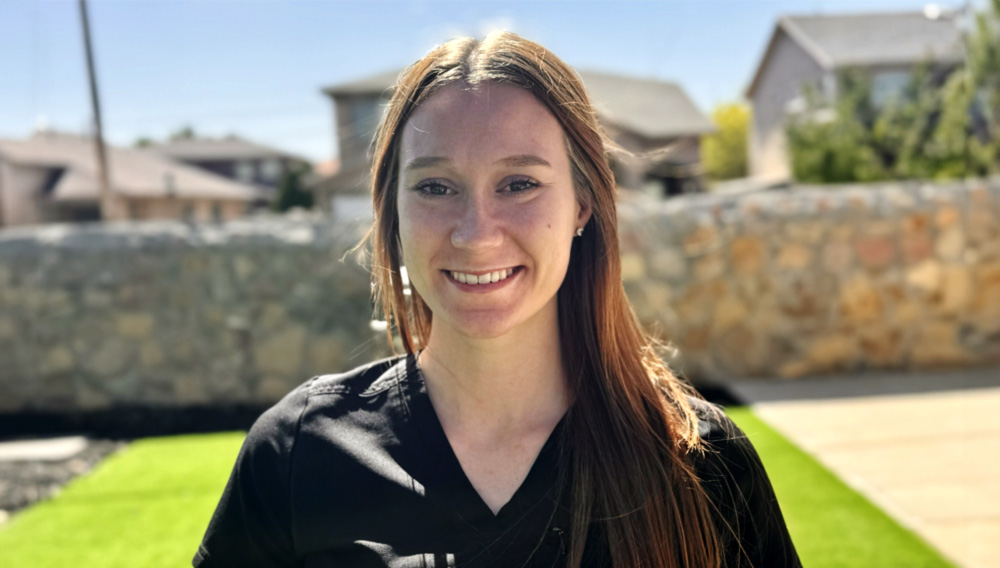An Admissions Counselor
Can Help You:
Finish your degree sooner | Make college affordable | Create a plan to achieve goals
Fill out our 3-Step form to get started
Expand Your Career Possibilities with an Associate Degree in Nursing
In this competency-based Associate in Science in Nursing program, LPNs, LVNs, paramedics, and certain military personnel can build their knowledge of nursing theory through educational experiences and demonstrate your RN-level competency in a clinical setting. You can progress at your own pace using 8-week fully online courses. You’ll have access to learning resources, such as tutorials and webinars, throughout the program. You will also have support from nursing faculty and your academic advisor who are only a call or email away, as well as from your peers through discussion boards, email, and other outreach.
Excelsior University also offers an Associate in Applied Science in Nursing. The two degrees have identical nursing component requirements, but they differ slightly in their general education requirements. The associate degree programs provide an alternative educational approach to earning an associate degree in nursing. The nursing component is designed to ensure students possess competence in theory and performance in nursing comparable to that of graduates of campus-based associate degree programs. The programs require outstanding critical thinking skills and nursing judgment as well as commitment to academic rigor.
Graduates of Excelsior’s associate degree in nursing programs easily transition to the BS in Nursing for Registered Nurses program and can apply credit they’ve already earned toward the bachelor’s degree.
Review details about the associate degree in nursing programs.
Fast Facts:
$2.4 million new health care jobs are expected to be added by 2026 (Source: BLS)
AS holders earn $132 more per week compared to those with no college degree (Source: BLS)
The average median RN salary is $73,300 (Source: BLS)
66
credit hours
Online AS in Nursing Program Details
- Cornerstone Requirement
- Information Literacy
- Written English Requirement
- Humanities Requirement
- Social Sciences
- Life Span Developmental Psychology Core
- Sociology Core
- Natural Sciences and Mathematics
- Human Anatomy and Physiology Core
- Microbiology Core
- Mathematics
- Arts and Sciences Electives only
Phase I
Transition to the Professional Nurse Role
The knowledge and problems related to discomfort, pain, and sensory impairment. Growth and development and its relationship to health, injury prevention, illness, and continuity of care in a variety of settings are discussed. Chronic illness, disability, and end-of-life needs are addressed. Pertinent ethical, legal, and regulatory requirements, along with the standards of professional nursing practice, are addressed. Principles, concepts, and theories from the natural and social sciences in relation to safe nursing care are applied to patients and families across the life span.
Essentials of Nursing Care: Health Safety
This content focuses on the use of nursing process to provide and manage patient-centered care for persons across the lifespan. Therapeutic communication, stress and adaptation, and patient-teaching are discussed. Documenting and reporting nursing care and the use of informatics in health care are presented. The concepts of health promotion, maintenance, obtaining a health history and the techniques of physical assessment are presented. Attention to safe and effective care with respect to environmental safety needs, emergency preparedness, use of restraints, infection control and the prevention of pressure ulcers is explored. Pharmacology, safe medication administration and related nursing care are also addressed.
Essentials of Nursing Care: Health Differences
Patient-centered care addressing the promotion of health and achievement of optimal outcomes for patients experiencing health problems related to nutrition, elimination, oxygenation, fluid and electrolyte balance, activity and sleep is presented in this requirement. Knowledge of anatomy and physiology and the nursing process is used to support nursing judgment. Ethical and legal implications along with evidence-based standards of nursing practice are presented in relation to safe, quality nursing care for patients and families across the life span.
Foundations in Nursing Practice
This requirement focuses on the application of the nursing process to support nursing judgment for the provision of evidence-based, patient-centered care. This requirement also includes the care of culturally diverse patients experiencing health problems related to discomfort, pain, and sensory impairment. Growth and development and its relationship to health, injury prevention, illness, and continuity of care in a variety of settings are discussed. Chronic illness, disability, and end-of-life needs are addressed. Pertinent ethical, legal, and regulatory requirements, along with the standards of professional nursing practice, are addressed. Principles, concepts, and theories from the natural and social sciences in relation to safe nursing care are applied to patients and families across the life span.
Phase II
Reproductive Health
The care of patients and families across the life span with needs related to human sexuality, childbearing, congenital anomalies, genetic disorders, and male/ female reproductive disorders is the focus of this requirement. Evidence-based, culturally sensitive nursing care, standards of professional nursing practice, as well as ethical, legal, and regulatory requirements are addressed. Principles, concepts, and theories from the natural and social sciences in relation to safe, quality nursing care are applied to patients and families across the life span.
Health Differences Across the Life Span 1
This requirement focuses on the application of the nursing process to support nursing judgment and the provision of patient-centered care for patients with acute and chronic cardiovascular and respiratory health problems, impaired blood cell formation, and abnormal cell growth. Evidence-based, culturally sensitive nursing care, standards of professional nursing practice, as well as ethical, legal, and regulatory requirements are addressed. The natural and social sciences are applied to the delivery of quality nursing care for patients and families across the life span.
Health Differences Across the Life Span 2
This requirement focuses on the application of the nursing process to support nursing judgment and the provision of patient-centered care. A wide variety of health problems are presented. These include mental health disorders, cognitive impairment, diabetes mellitus, and dysfunction of endocrine, hepatic, biliary, renal, and pancreatic systems. Evidence-based, culturally sensitive nursing care, standards of professional nursing practice, as well as ethical, legal, and regulatory requirements are addressed. The application of anatomy and physiology, microbiology, and social science concepts is essential for the provision of safe quality patient care.
Health Differences Across the Life Span 3
This requirement focuses on the application of the nursing process to support nursing judgment and
the provision of patient-centered care for persons with health problems related to infectious and communicable diseases, tissue trauma, neurological dysfunction, and musculoskeletal disorders. Content areas include immune function, chain of infection, perioperative nursing, and neuromuscular functional assessment. Health problems such as HIV/AIDS, tuberculosis, hepatitis, degenerative diseases, stroke, and trauma are highlighted. Evidence-based, culturally sensitive nursing care, standards of professional nursing practice, as well as ethical, legal, and regulatory requirements are addressed. Principles, concepts, and theories from the natural and social sciences in relation to safe quality nursing care are applied to patients and families across the life span.
Clinical Nursing Practicum: Care of Patients Across the Lifespan
In this clinical course, students focus on application of contemporary competencies and practice guidelines for delivery of safe, quality patient care. Laboratory experiences provide opportunity for further development of nursing judgment applicable to the clinical environment. Students provide direct care for patients across the lifespan who are experiencing non-critical medical-surgical conditions in the acute care setting. Students are scheduled for clinical experiences and are required to travel to clinical site during the course term. Satisfactory grades in the laboratory and clinical experience are required to pass the course.
Phase III
Competencies for Contemporary Nursing Practice
This course is designed for students to apply competencies for contemporary nursing practice. Safety, teamwork and collaboration, evidence-based practice, quality improvement, leadership and delegation, informatics, and professional role development are studied. Students will engage in weekly, faculty-facilitated virtual clinical experiences while caring for clients in a variety of care settings, across the lifespan. Satisfactory application of competencies in the virtual clinical experience is required to pass the course.
Nursing Capstone: Advanced Clinical Practicum
The content in this clinical course will assist students to further develop their role as a member of the profession and continue to prepare them for professional nursing practice. Emphasis is on advanced skills, knowledge, judgment, and professional values. This course includes a laboratory and a dynamic clinical practice experience caring for multiple patients in a healthcare facility. Students are scheduled for clinical experiences and are required to travel to clinical site during the course term. Satisfactory grades in the laboratory and clinical experience are required to pass the course.
- Use a caring holistic approach to provide and advocate for safe quality care for patients and families in an environment that values the uniqueness, dignity, and diversity of patients.
- Apply the nursing process to make nursing judgements, substantiated with evidence to provide safe, quality patient care across the life span.
- Use principles of management and delegation to implement plans of care with members of the intraprofessional team to achieve safe, quality patient outcomes.
- Demonstrate the standards of professional nursing practice and core values within an ethical and legal framework.
- Apply principles of leadership and interprofessional collaboration to improve patient outcomes.
- Use evidenced-based findings and information technology to improve the quality of care for patients.
Surveys are administered to our nursing program students upon graduation and at one year post-graduation. The survey results are available here.
View our catalog for additional information.
Common Careers with an
Online AS in Nursing

- Nurse entrepreneur
- Patient care in high-activity units, such as intensive care units
- Patient care in outpatient settings
- Supervisory position in long term care
- Travel nursing

Charlie-Renee Boggs
Associate in Applied Science in Nursing, 2024
Recognitions & Accreditations
New York State Board of Regents – Recognized Programmatic Accreditation
Excelsior University’s associate-level nursing programs are programmatically accredited by the New York State (NYS) Board of Regents, State Education Department Office of the Professions (the Regents). The U.S. Department of Education has recognized the Regents as a state agency for the approval of nursing education programs since 1969. More information about the NYS Board of Regents’ Recognized Programmatic Accreditation may be helpful for students or graduates to present to a school they are attending or to an employer seeking more information about their Excelsior University nursing degree.
Institutional Accreditation
Excelsior University is an accredited institution and a member of the Middle States Commission on Higher Education (MSCHE or the Commission) www.msche.org. Excelsior University’s accreditation status is accreditation reaffirmed. The Commission’s most recent action on the institution’s accreditation status on June 23, 2022 was to reaffirm accreditation. MSCHE is recognized by the U.S. Secretary of Education to conduct accreditation and pre-accreditation (candidate status) activities for institutions of higher education including distance, correspondence education, and direct assessment programs offered at those institutions. The Commission’s geographic area of accrediting activities is throughout the United States.
All of Excelsior University’s academic programs are registered (i.e., approved) by the New York State Education Department.

